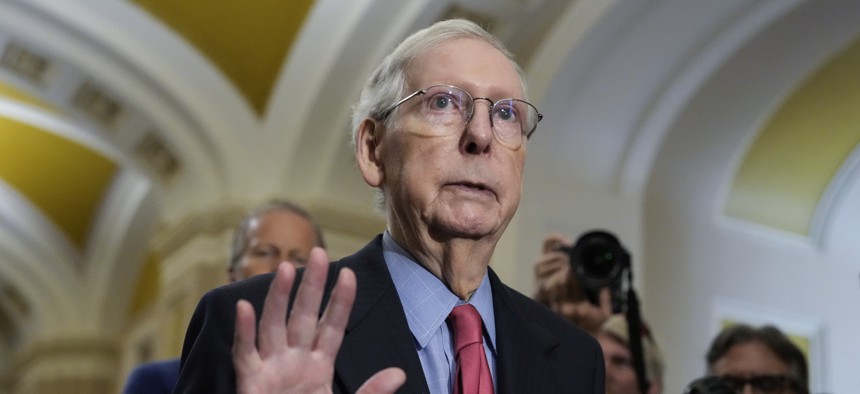Opinion
Bill Cotterell: Term limits won’t solve the 'senioritis' in Washington
No matter how long they stay, we keep sending the same kind of people to Congress and the White House, our Capitol Columnist writes.

Senate Minority Leader Mitch McConnell (R-KY) speaks during a news conference following a closed-door lunch meeting with Senate Republicans at the U.S. Capitol September 6, 2023 in Washington, DC. McConnell declined to elaborate about his recent health issues and pointed reporters to a statement from the Attending Physician of Congress Dr. Brian P. Monahan. Photo by Drew Angerer/Getty Images
When politicians want to seem smart, while admitting a problem is beyond their reach, sometimes they’ll trot out that line from Shakespeare’s “Julius Caesar”: “The fault … is not in our stars, but in ourselves.”
Shakespeare could have been thinking of America’s current self-created crisis of government by gerontocracy. Put bluntly, too much is run by people who are too old, and they’re too set in their ways to do anything about it. And I say this as a guy born when Franklin Roosevelt was president.
Even worse, the stars of Washington will, eventually, be replaced by younger and maybe dimmer versions of themselves. That’s because, with districts gerrymandered as they are, large blocs of voters — “ourselves,” as The Bard put — keep sending the same kind of people to Congress and the White House, where they patch up problems we keep creating.
Former House Speaker Nancy Pelosi, at age 83, recently announced she will run for re-election to the congressional seat she has held since Ronald Regan’s second term.
Across the Capitol, U.S. Senate Minority Leader Mitch McConnell didn’t answer a question about running for an eighth term in 2026. The Kentucky Republican, who’s 81, didn’t dodge the question. He froze up momentarily, staring blankly until an aide gently intervened.
And that was the second time that happened in a couple months.
The image of the Senate as what GOP presidential candidate Nikki Haley called “the most privileged nursing home” is reinforced by TV shots of Sen. Dianne Feinstein, 93, being wheeled around and coached how to vote in committee.
Meanwhile, we’ve got a president running for a second term that, if successful, will have him exiting the White House at age 86. And his leading challenger is former President Donald Trump, who hopes to return when he’ll be 78.
Poll after poll shows that Americans don’t want a Biden-Trump rematch next year. About three-fourths of Democrats think Biden is too old and although Trump holds commanding leads among GOP voters, most surveys show a dead heat between him and Biden.
But who cares about voters? People in power do man-in-the-mirror polling; it’s how they see themselves that matters. Biden remains cheerfully confident, telling his party skeptics to chill out.
That’s why Congress will never impose term limits on itself – nor should it.
With recent events, such as McConnell’s freeze-up and Biden’s bumbling, there seems to be growing support for term limits. Maybe even an age limit for the presidency or election to Congress. Both are really bad ideas.
Telling the most powerful people to quit feels good. We show them we're the boss. They’ve got the airplanes and limos and money, but we can take it all away when we tire of them – at least, in theory.
That’s what Florida did in 1992, enacting a constitutional amendment setting longevity limits for state Cabinet officers and legislators (governors were already confined to two terms).
The Eight is Enough petition initiative, named for a TV show popular at the time, picked up a tail wind from a few mini-scandals in Washington, notably financial abuses of the House post office. The Republican Party seized on it, with the help of conservative talk radio.
So, have you noticed the great improvement in Florida government since “Eight is Enough” kicked in?
Me neither.
What term limits did accomplish was to replace the good legislators and Cabinet members, and the bad ones, with new faces who may or may not be better or worse. The flaw in term limits is they just mark time. There’s no assurance the successor will be an improvement.
It’s the same with age limits on public offices. We all know people who are hardy and alert in their 80s, or bonehead dumb in their 20s.
Consider a few current examples. Rep. Matt Gaetz, R-Fla., is 41. Rep. Alexandra Ocasio-Cortez, D-N.Y., is 34. Both are fairly new to Congress. You couldn’t find two more different members.
Similarly, McConnell and Pelosi made their Washington debut when “Phantom of the Opera” was the hot new Broadway sensation.
But it’s not their ages, or how long they’ve been in office, that made them the right wingers or the liberals that they are. And when they leave, the people of Pensacola, Queens, San Francisco and Kentucky will replace them with people just like themselves.
The fault – or virtue – lies not in our politicians, but in ourselves for electing them.
Bill Cotterell, a retired capitol reporter for United Press International and the Tallahassee Democrat, writes the “Capitol Column” for City & State Florida. To reach him, email bcotterell@cityandstatefl.com.
NEXT STORY: 'Is this Steve Schale? Hi, this is Lucy Morgan'
